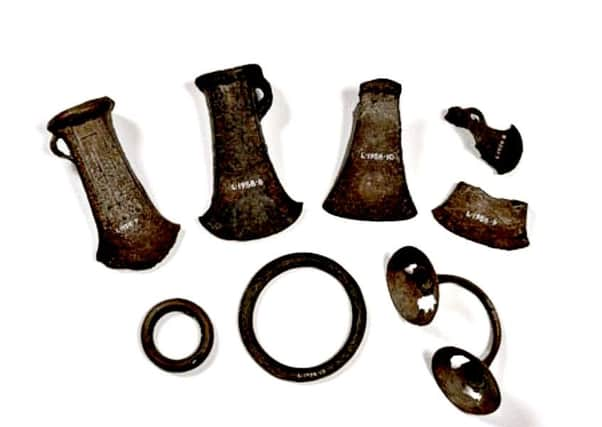Mysteries of buried Bronze Age treasures unravelled


During the Bronze Age, our ancestors gathered together pieces of metalwork and buried them in the ground with more than 100 such collections recovered from the land over time.
No one can be quite sure why the belongings, which usually held some value or significance, were left in this way.
Advertisement
Hide AdIt may have been a way of people connecting with the landscape or a sacrifice of wealth, said Dr Matthew Knight, Curator of Early Prehistory at the National Museum of Scotland.
The underground hoards may also have been a way of marking out territories, with the metal work usually buried at distinctive points in the landscape.
Dr Knight said: “We think that these hoards were left as people expressed a connection with the land.
“It might have been part of a political and sociocultural practice of claiming your spot in the landscape or a way of sacrificing part of your wealth.
“The hoards may also be a way of storing valuable materials but that doesn’t explain why they are still buried more than 2,000 years later.”
Breakthrough research has been carried out on the Poolewe Hoard, a collection of axes, rings and an ornament - possibly a cloak fastener - that was discovered by a local man digging peat in the late 19th century on the north side of the River Ewe in Gairloch.
Advertisement
Hide AdRecent radiocarbon dating of a piece of surviving wood from one of the axes determined that the tool was buried between 750 - 800 BC.
The date has offered up new important information about the hoard, which could potentially be the last one buried in Scotland, Dr Knight said.
Advertisement
Hide AdHe added: “It has huge potential for how we understand this period.
“We had always suspected the axe dated to around this time but it is always nice to have it confirmed by science.
“Potentially this is the last Bronze Age hoards to be buried in Scotland and it makes it quite exciting that we are seeing the end of this period.”
Dr Knight said it was widely accepted that there were no other Bronze Age hoards that are obviously later than this one.
The research on the Poolewe Hoard was carried out as preparations are made to return the collection to the Highlands so it can go on show at the new Gairloch Heritage Museum next Spring.
